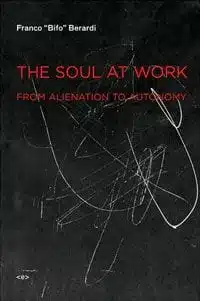
What would Karl Marx say about today’s global economy? What impressions would he take from labor not done in a sooty industrial prison, but instead at a computer in a climate controlled office? In The Soul At Work Franco Berardi (Italian Autonomist, media theorist, radio pirate, and staunch anti-capitalist) applies post-Marxist philosophy to our digital world. It’s a polemical and challenging work, and Marx is the linchpin for the whole operation.
Fortunately, readers with little love for Communist theory won’t necessarily need to throw the baby out with the bathwater. Though Berardi — or Bifo as he’s best known — is indeed hardcore, he has important insights into the nature or work, passion, and the creative class that are worthy whether or not you fly a red flag.
Bifo’s work has not found English translation until recently. He’s best known in Italy and France as an important member of the radical student/worker Autonomist movement: a quasi-anarchistic organization that was into creating happenings, most famously protests aimed at refusal of work. Bifo’s driving question is how his organization’s particularly radical contribution to the ’60s zeitgeist — the refusal of work — become replaced with a 24/7, Blackberry-by-bedside, workaholic culture. Strip away his academic language and he seems to be urging us to slack-off more.
In Bologna, Berardi ran a pirate radio station called “Radio Alice” which was an open forum for radical political discourse. Later, in Paris, he worked with Félix Guattari on a progressive therapy called schizoanalysis. Semiotics and critical theory also inform his thought. Heavy stuff, but without the Marxist lens Bifo’s concern is the state of the creative class and psychological impacts of an accelerated culture.
Art is a primary concern, as it now seems devalued unless it increases capital. Poetry and painting become advertising. Art for art’s sake becomes child’s play. To top it off, everyone in the system is enslaved by debt.
At this point Marx reenters the equation. The theorist’s critique of capitalism as insatiable engine of value creation and profit is applied to cognitive labor. As opposed to the physical pain of factory work, many jobs today involve sitting and typing. If all the sitting and typing we do isn’t detrimental to the body, Bifo would argue its hell on the soul.
Here he is saying that the capitalistic drive to produce profits from mental labor is the cause of some serious postmodern angst. This takes us to his definition of the soul as an energy that “transforms biological matter into an animated body” and situates it within semiocapitalism — his term for “post-Fordist modes of production”.
Bifo’s writing style is academic and demanding, but also oddly exciting and fun. It’s important to understand that he writes as a philosopher, structuring his prose in brief argumentative parcels that slowly build his concepts. It’s dazzling, Rubik’s Cube-like prose, with slowly twisting neologisms and bits of theory coming together in creative ways.
Here’s a taste of some of the most abstract: “The infinite capacity of replication of the recombining simulator device erases the originality of the event.” Or how about: “The productive finalization of technology ends up subjugating the thinking process from the standpoint of its own epistemological structures.” Indeed.
Capitalism, and his absolute distaste for it, is where Bifo makes himself absolutely clear. It’s the catch-all cause for all modern strife, a “pathogenic mechanism” that is the ruin of everything. Preaching “liberation from capitalism” is where the author will most likely loose all but the most radical of readers.
The capitalist system is clearly not without faults, but presenting it as scapegoat for every ill we face may be too simple. At times Bifo seems a cranky old curmudgeon madly shaking his fist at the present. This is the Bifo that bemoans “collective mental pollution” and says of the world: “too many signs, too fast, too chaotic.” His qualms with hyperreal society are at times a good diagnosis of our problems, but the prescribed anti-capitalist panacea remains questionable.
For all the theory involved to make his case, Bifo’s solution is strangely and kind of awesomely underwhelming. We are urged to reconsider how wealth is defined, to focus more on friendships and an easygoing life rather than profits. Who but Henry Ford himself could argue with that? The volume ends with a few thoughts on the current Great Recession, where the collapse of the economy “can be read as the return of the soul.” For that, we will have to see.
Despite a few glaring unanswered or unaddressed tidbits (What about intellectual property, capitalism as it exists in developing countries, or the strange possibility that people may actually enjoy what they do?) Bifo proves to be perpetually challenging and rewarding, capable of filling both mind and soul. His latest book is, to bestow a capitalist’s top accolade, a work of great value.
